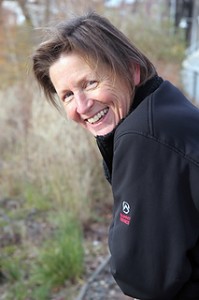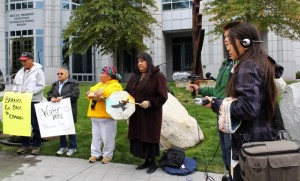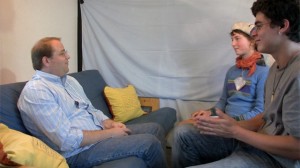This guest blog was written by Debra Weistar, co-director of Finding the Good Traveling Semester Program.
“This was the most amazing day ever. I learned more today than in all the years of my education.”
–Wyatt Maniarrez, Oct. 6, 2011, after attending a court hearing between the Western Shoshone and the Bureau of Land Management arguing for the protection of water on Mt. Denaho in Nevada, where the largest mining corporation in the world is mining for gold on public lands.
Wyatt is 16 years old.
I should mention that the education Wyatt received on that day included a crash course on Rights of Nature and rights-based governance. As a prospective student in Finding the Good Traveling Semester Program, Wyatt joined us for a day. When he is enrolled in the full semester on January 2012, he will take a block course on community rights, Rights of Nature, corporate personhood, the regulatory system, the history of the Constitution of the United States, and social movements. Did I mention this is for high school?
Without the crash course in Rights of Nature and rights-based governance, Wyatt would likely have come away from the day in despair, instead of with his eyes wide and his head full of new thoughts. The hearing was, in his words, “stacked heavily in favor of the BLM and Barrick Gold Corporation” and we witnessed the lawyer for the tribes argue within the regulatory “script” to try to save the waters of Mt. Denabo. The argument was not about rights – the right of Mt Denabo to “exist, flourish and evolve”, nor of the Western Shoshone’s ancient rights to the land and water. Instead, the argument was, as it most often is, about an interpretation of a possible flaw in the EIS (Environmental Impact Statement) carrying the slim chance that the waters of Mt. Denabo – a sacred site to the Western Shoshone – might be partially protected. Opposition to the mine itself years ago was not successful and the open pit at the base of Mt. Denabo is well over a mile across.
Not an encouraging picture, to be sure, in an all-too-familiar scenario in the fight to protect and preserve the fragile ecosystems on which we all depend. The difference, to Wyatt and the other students who are learning about corporate personhood and community rights, is that they are also learning about rights-based governance, and what that might mean to them as citizens and young leaders. They can participate in action that is based on standing up and saying “no” to corporate destruction, instead of begging for lesser harms. So even though the picture is bleak, frustrating, and frightening, they are no longer bound by a myth and controlled by a fiction in their own minds. The truth can be hard, but knowing the truth is essential to an authentic education. Authentic education is essential for social change.
Youth need to learn from community organizers doing rights-based work. At Finding the Good (FtG) they learn from Shannon Biggs, Rights Based Campaigner for Global Exchange, and Ben Price from CELDF, the Community Environmental Legal Defense Fund. They interview people like Thomas Linzey, co-founder of CELDF, to learn about communities that are claiming their right to self-governance, drafting and passing ordinances that keep destructive corporate activity out. FtG is currently working with Shannon Biggs and others to create a Youth Summit for Rights of Nature and Rights Based Organizing.
In front of the courthouse on the day of the hearing, Wyatt along with Skye, media intern for Finding the Good, shot footage of the water ceremony and speeches with tribal members. They interviewed Shoshone grandmothers who spoke about the sacredness of water, and how water has a right to flow unimpeded and pure. “That’s what we believe”, said Mary McCloud, “that’s the Indigenous way.” They heard the lawyers for Barrick Gold and the lawyers for the government make statements like, “There can be degradation, just no “undue” degradation”, when speaking of the water. When the issue of Shoshone religious and cultural values was brought up, they argued that those cannot be “quantified” and therefore do not fit into the established analytical model. As such, they cannot be considered. Wyatt and Skye can consider them, though. They can also consider that humans and Nature have inherent rights and that those rights must be protected.
Wyatt and Skye will take the footage they shot and the interviews they recorded and produce news pieces for our local radio station and online news source, as well as the Finding the Good blog. While they may not yet be prepared to draft a new constitution recognizing the rights of Nature, they are learning to educate others on issues and solutions that can lead to a just and sustainable world.
Finding the Good Traveling Semester Program is open to all high school juniors and seniors, and gap year students. Please visit the Finding the Good student blog at www.blog.findingthegood.org
To donate to Global Exchange’s ongoing Community Rights Program, please click here.



